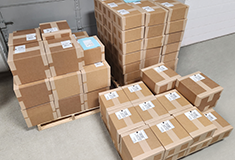

Paper, like lumber, is a forest product, and like lumber, paper has a grain direction.
Grab a sheet of ordinary copy paper. Try folding it in half along the 11” direction. It will probably fold smoothly and easily.
Take another sheet, turn it sideways and fold it along the 8½” direction. We’ll bet the fold will be considerably rougher, perhaps even cracking on the fold.
You may or may not notice the difference on a single sheet of copy paper, but grain direction makes a big difference when printing and binding.
Grain direction has the biggest impact in two areas: folding and perfect binding.
Grain direction is invisible on a flat sheet, but the wrong grain can turn a beautiful project into a work of mediocrity.
Paper naturally folds with the grain. Folding against the grain can result in a rough, uneven fold and may even crack, especially if there is printing on the fold area.
The thicker the paper, the more this is a problem, so grain parallel to the fold is particularly important on cover and index weight papers.
Of course this applies to saddle stitched booklets, which are bound by stapling on the fold.
As a rule, Copresco scores covers on perfect and saddle bound books to minimize any problems.
Scoring is a good practice whenever a heavier-weight paper will be folded, to prevent cracking on the fold.
Paper is a dynamic medium. It gives off and takes on moisture from the surrounding environment, and expands or contracts accordingly, against the grain direction.
Perfect binding (aka softcover or adhesive binding) glues the paper on the bind edge.
If the grain direction is perpendicular to the spine, the glue prevents the paper from expanding or contracting, resulting in an unsightly waviness of the book body.
Sometimes printers are tempted to use wrong-grain or mixed-grain paper for a more efficient cut to keep prices low.
Don’t do it! The pennies you save aren’t worth less-than-satisfactory results.
Instead, call the company that knows paper, up and down, left and right. Call Copresco.
United Parcel Service (UPS) prices increased an average of 6.9% effective December 27, 2022.
FedEx also implemented an average increase of 6.9% on January 3, 2023.
The United States Postal Service (USPS) may not be reliable for deliveries, but we can always count on them for price increases.
A first-class stamp increased 5% to 63¢ on January 22, 2023.
USPS’s Priority Flat Rate envelope, a cost-saving alternative for small, single-item packages, increases to$9.65.
This is being sold as a “reduction” from the holiday rate of $9.90 but is actually a 7.8% increase from the previous rate of $8.95.
At Copresco we’ve always emphasized that your project isn’t completed until it arrives safe and sound at its final destination.

That means that shipping and forwarding expertise is almost as important as printing and binding skills.
Many people don’t pay attention to freight cost, but we do!
There are often better ways to ship than UPS, FedEx or USPS.
Count on Copresco to find the most economical freight rate combined with ontime delivery for you.
We’ve discovered that Copresco has suffered from an e-mail glitch that kept some of our messages from being delivered, especially to Gmail accounts.
If you never received an expected reply to an email, please let us know. We value your business!
You can always contact Copresco here.